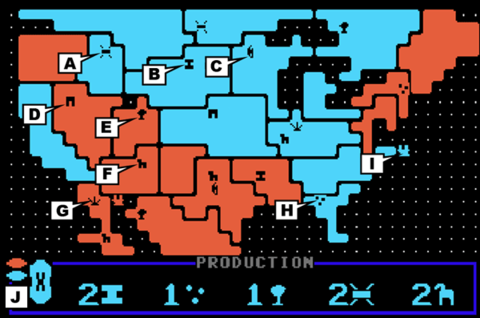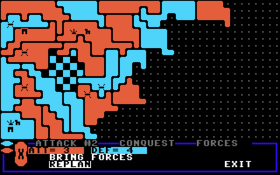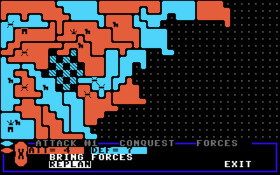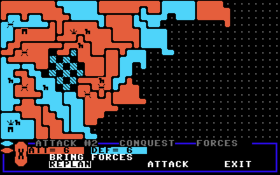Lords of Conquest
| Lords of Conquest | ||
|---|---|---|
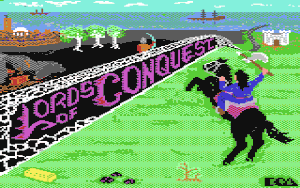 | ||
| Game No. | 192 | |
| Voting | 7.13 points, 15 votes | |
| Developer | Bill Eberle, Jack Kittredge, Peter Olotka, Ted Schmeckpeper, Trevor Western | |
| Company | Eon Software Inc. | |
| Publisher | Electronic Arts | |
| Musician | Mark Sutton-Smith | |
| HVSC-File | GAMES/ G-L/ Lords_of_Conquest.sid | |
| Release | 1986 | |
| Platform | C64, Apple II, Atari, Atari ST, PC-DOS | |
| Genre | Strategy, War | |
| Gamemode | Single player up to 4 players (in turns) | |
| Operation | ||
| Media | ||
| Language | ||
Description[edit | edit source]
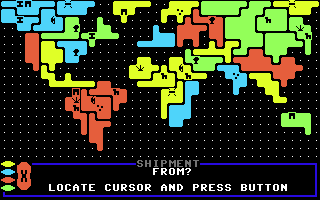
Lords of Conquest is a strategy game by Electronic Arts from 1986, which was first written for the Apple II and then ported to the C64. It is based on the board game "Borderlands" by the English game manufacturer Eon and is designed for either up to four players or a single player against a computer opponent. The one who makes it to build or conquer three towns and keep them at least for one game round is the winner. If several players start to gain control over their third town in the same round, the game will continue until one of them loses a town or builds a fourth town. There is the alternative that you completely eliminate your competitors, but from experience both human players and computer opponent (!) throw in the sponge before it comes to that.
To be able to build and defend the required three towns or, if necessary, to capture the hostile towns, the players need resources (iron, coal, wood, gold and horses), which they can gain from the correspondingly marked provinces of the map and which need to be protected from the graps of the other players. While the game against a single opponent is limited to pure tactics with military units, a game with three or four players has an additional trading phase, in which resources can be swapped / begged / blackmailed. Additionally, the players can side with the attacker or the defender during an attack. With this Lords of Conquest also allows many diplomatic interaction by founding and breaking (short-lived) allies and at the end everyone screams in confusion and goes for each other's throats... the way it should be!
The game comprises twenty ready-made maps (Northamerica, China, Mediterranean area, world etc.) as well as the possibility to get new maps generated or create own maps in the editor.
Course of the game[edit | edit source]
After setting the desired parameters in the options screen (see more in section "Hints" below) you decide on which map the game should take place. Then you have the possiblity to change the positions of the resources on the map. When you are satisfied with the map, the allocation of the land is done, in which the players choose each a province in turns from the map, until none is left. Then the actual game starts.
Course of a game round[edit | edit source]
Every round (1 year) consists of several phases:
- "Production"
- "Trade" - only with three or four players!
- "Shipment" (transport phase))
- "Conquest"
- "Development" (building phase)
In each phase the players take an action one after the other. The order of the players is newly decided at the start of every round.
Between the phases you can enter a menu by pressing the fire button, in which you can make some settings or save the game.
I) Production phase[edit | edit source]
Each province with a resource symbol generates a corresponding resource. All resources go into the "Stockpile" of the player until the development phase at the end of the round starts. This stock is located in a province chosen by the player after the first production round and can be changed later. If this province is conquered by an opponent, he will loot all the collected resources, which is equal to a catastrophe and is most of the time decisive for the game. Therefore, the position for the stockpile must be chosen wisely.
Horse resource is a special case: Horses do not go to the stockpile of the player, but spread on the map. If a horse is already in a horse resource province, another horse is then "born" in a randomly chosen adjacent province. This happens until all coherent provinces of the player are equipped with horses and there is no space left.
II) Trading phase (only with three or four players)[edit | edit source]
The players have now the possibility to trade with resources. You can try to get things that you lack by swapping and maybe add authority to your demands with threats or try to curry favour with the opponent by giving gifts. Of course inflated exchange rates are a daily occurence with such transactions similar to the classic trading simulation M.U.L.E.. You should only beware that your nice neighbour not just simply marches over the border to take with violence the things that you do not want to give him.
III) Transport phase[edit | edit source]
The player has the possibility to either move his stockpile to a new province or move either a horse, a weapon or a boat from one province to a neighbouring province. Horses can now pick up weapons and move them along to two fields. Boats can carry a horse and/or a weapon and move as far as a water connection to the destination exists.
IV) Conquest phase[edit | edit source]
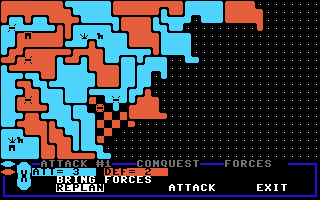
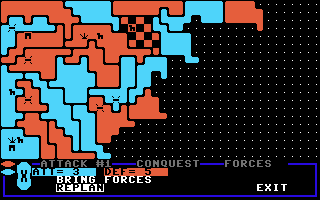
Every player has up to two attacks onto hostile neighbouring provinces. If the first attack is successful, he can then either make a second attack or move his stockpile into another province. But if the first attack fails, this phase ends prematurely. Hostile horses, weapon and boats in a conquered province are also conquered and change sides.
With Plan Attack you mark the start of the attack and choose the destination province, whereupon the game shows the forces of attacker and defender. If the own strength is enough for an attack, the menu point "Attack" appears and the attack is either successful or warded off.
If the own forces are not enough you can bring up one of your own horses or one boat by choosing "bring forces".
- Horses can be brought up from a distance of up to two fields to the attacked province and also bring a weapon with "pick up weapon".
- Boats can even be brought up from any distance, as long as they can reach the coast of the destination province. Boats can also bring a horse and/or a weapon with "pick up...".
If the forces are still not enough or you have changed your mind, you choose "Replan" and can look for a different aim.
If you lose a battle, all your units (horses, boats, weapons) that were brought up per "bring forces" are DESTROYED!
ATTACK FORCE
- Each own province, that borders the enemy province contributes 1 force point.
- Each horse in provinces, that border the enemy province contributes 1 force point.
- Each town in provinces, that border the enemy province contributes 2 force point.
- Each weapon in provinces, that border the enemy province contributes 3 force point.
- Through "bring forces" maybe further force points can be brought up, if available (horse: 1, horse+weapon:4, boat:2, boat+horse:3, boat+horse+weapon:6)
DEFENCE FORCE
- The attacked province itself contributes 1 force point.
- Each own neighbouring province contributes 1 force point.
- A horse in the attacked province or on an own neighbouring province contributes 1 force point.
- A town in the attacked province or a neighbouring province contributes 2 force points.
- A weapon in the attacked province or a neighbouring province contributes 3 force points.
- A boat in the attacked province contributes 2 force points.
- The defender CANNOT bring up additional force points!
The whole thing sounds utterly complicated, but it is not, as the game immediately calculates the forces for you as soon as you start an attack. If you want to know the forces of unreachable provinces you choose the menu point "Info" and then "Force count".
WAR IN MULTIPLAYER MODE (3 or 4 players)
If a a player attacks another player all the other players that own neighbouring provinces next to the attacked province are asked if they want to help the attacker or the defender. Same as in the trading phase you also have to try to draw the co-players on your side by using diplomacy (eg. lying, threats, (ir)rational appeal, pithy talks, foot kicks, depriving of love, etc.) to get off well in this issue.
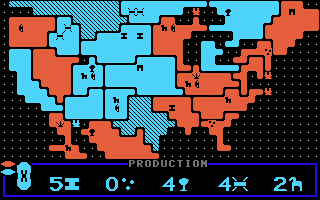
V) Development phase[edit | edit source]
The resources gathered in the production phase can now be used to build towns, weapons or boats. Horses do not get build, they multiply as described above during the production phase by themselves if a corresponding province is available.
- a weapon costs 1x iron and 1x coal and raises the attack and defence force of the province in which it is located as well as all bordering provinces by 3 points.
- a town costs 1x iron, 1x coal, 1x wood and 1x gold and raises the attack and defence force of the province in which it is located as well as all bordering provinces by 2 points. Additionally, a town doubles the resource symbols in the own province as well as in all bordering provinces of the player. The one who makes it to build three towns and keep them for one round wins the game! Provinces with towns are shown in dashed.
- a boat costs 3x wood, has an attack and defence force of 2 and can be used for attacks over water surfaces. Additionally a boat can also carry a horse (force 1) and/or a weapon (force 3) for a combined attack force of up to 6 points.
Special case of the resource gold: if a player lacks resources to finish a certain building project, he can use gold alternatively. A weapon costs 2x gold, a boat 3x gold and a town 4x gold.
Design[edit | edit source]
The unwritten law, that a wargame needs to look plain was also abided consequently in Lords of Conquest. That they did have the courage to release a commercial game with this mixture of charactersets and symbols on a downright stone-age niveau in 1986, must stem from the consent prevailing at that time, that the typical war game player would brake down due to stimulus satiation when looking at coloured high-resolution graphics. However, the clarity profits from this minimalism and thus the situation can be comprehended fast after a short familiarization. The sound can be noticed rather quickly as unpleasant - if one forgets to switch it off in the main menu - with repeating jingles when setting up a pawn or conquering a land. And even if you switch it off, you get faced with a DADADADAAAAA! from Beethoven's Symphony No. 5 with each move by the computer and at the end of the game even with a bearable version of the prelude and fugue no. 1 C-major, BMV846 (Video at YouTube ) from the "Well-Tempered Clavier" by Bach, if you want or not.
Hints[edit | edit source]
Controls[edit | edit source]
- In more complex situations the computer opponent can well need up to two minutes for the calculation of his move (that is what the manual says, but it seems that it can take even longer). If you do not want to wait, you can try to abort the calculation of the move by a press on the fire button. This sometimes works better or worse and according to the manual, the AI takes the move that it has calculated after 10 seconds anyway.
Explanation of game parameters[edit | edit source]
GAME LEVEL
The game level decides about the complexity of the game. The features described above can only be found in the whole in the EXPERT level. The lower levels have limitations.
Beginner: There are only two resources: horses and gold and boats cannot be build. In the transport phase you can only move your stockpile.
Intermediate: There are all the five resources but no boats can be build. In the transport phase you can only move your stockpile.
Advanced: There are all the five resources and boats can be build. In the transport phase you can only move your stockpile.
Expert: The complete game with all resources, boats and a transport phase in which you can also move horses, weapons and boats.
ELEMENT OF CHANCE
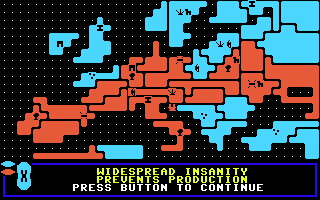
The more luck is in the game, the less predictable it gets and the more careful you need to act. The loss of a production phase or the failure of a attack thought to be successful can easily cost you the victory. On the other hand, one can turn around hopeless situations by pure luck.
Low: Every attack in which the attacker has at least the same forces as the defender is automatically successful. Attacks at a stronger defender are impossible. The computer plays best with this setting and the game needs utter concentration.
Medium: Every attack in which the attacker has more forces than the defender is automatically successful. Attacks at a stronger defender are impossible. When both have the same strength, the winner is selected by lottery. Production, trading and transport phases can fall out. This level can be chosen if you want to have a surprise every now and then (no matter if good or bad).
High: The success of an attack depends on the relative forces betweeen attacker and defender. Attacks with a significant superior number succeed often, attacks of short-handed teams seldom. Production, trading and transport phases can fall out. WARNING: This level can lead against human players to obscene expressions of resentment, St Vitus dances and other "emotional highlights" ...
DIFFICULTY LEVEL (only when playing against the computer)
The computer opponent plays equally good or bad on all levels, with this you can only set a handicap for the start for one side or the other, this is who is allowed to choose the first province, who has the first attack and how many extra provinces one gets.
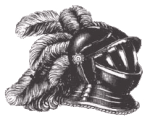
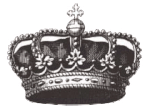
| Level | First province | First attack | Extra provinces |
|---|---|---|---|
| 1 | Player | Player | Player:4 |
| 2 | Player | Player | Nobody |
| 3 | Computer | Player | Player:2 |
| 4 | Computer | Player | Nobody |
| 5 | Player | Computer | Nobody |
| 6 | Player | Computer | Computer:2 |
| 7 | Computer | Computer | Nobody |
| 8 | Computer | Computer | Computer:2 |
| 9 | Computer | Computer | Computer:4 |
Surrendering computer opponents[edit | edit source]
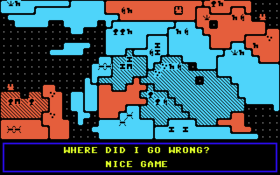 |
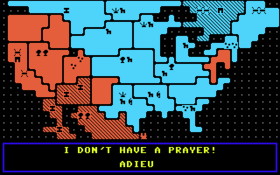 |
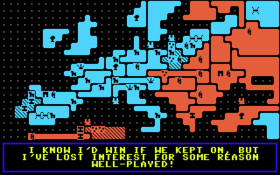 |
Sometimes, the AI will realize it cannot win and withdraws from the match with an amusing comment. This is always a cause for joy ("YAY, I have outsmarted an 8bit computer!") The computer opponent's comments are quite funny.
Solution[edit | edit source]
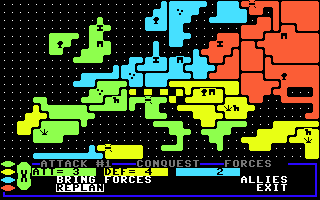
- The war already starts with the allocation of the land at the start of the game. Provinces with resources are of course in great demand, especially iron and coal to build weapons and horses as they rise the forces for fights and reproduce themselves. On maps with much water wood can get extremely important to conduct surprise attacks with boats. Such a wild boat loaded with a weapon and a horse has after all a force of 6!
- Choosing provinces that lie crisscross scattered over the map during the allocation of the land are not much use, they are hard to defend due to little coherence and they can only execute little attack force. If you keep your provinces close together and at the same time surround hostile lands with them, you can create the basis for a solid emplacement with the first moves most of the time. A coherent lump of provinces without resources in them is, however, also mostly senseless.
- If you have the choice of either building a town or a weapon, you need to deliberate about whether the raised production is worth it or if one can better gain the resources by force. If you can enhance two or more resource provinces by buildung a town - best with different resources - this is most of the time a very good strategy.
- The own stockpile must be protected from access by the enemy, best in a province which is as strong as possible, i.e. which has many neighbouring provinces. If this is not possible, you should try to put the stockpile on a deserted island, at least as long as there are no boats in the game. Losing the stockpile is most of the time the player's doom, "unless" he can re-conquer it in the same move or he can conquer a third town to win the game.
- If a hostile province cannot be gained at first go, you should try to isolate it from as many neighbouring provinces as possible, in which you then send new troops (horses with weapons).
- As the order of the players rotates and everybody is in turns first or second, one can plan ahead. E.g. in every two-player game its every player's turn twice.
Cheats[edit | edit source]
None!
Voting[edit | edit source]
| Voting of the C64-Wiki users (10=the best vote): | ||
| 7.13 points at 15 votes (rank 417). You need to be logged in to cast a vote. | ||
| C64Games | 5 | 16th March 2011 - "so so" - 1523 downs |
| Lemon64 | 8,8 | 16th March 2011 - 24 votes |
| Kultboy.com | 8,50 | 16th March 2011 - 2 votes |
| Happy Computer | 79% | Issue 05/88 |
| ZZap64 | 86% | Issue 12/87 |
Reviews[edit | edit source]
Robotron2084: "A really great strategy game, which is racked with daunting graphics but is incredibly fun. The computer opponent is programmed diabolically well and poses a very sophisticated enemy in the higher difficulty levels which can cause you very painful defeats when you think that you have already won the game. This is by far the best and most equitable AI that I have ever seen on the C64 - except for some chess programs. The replay value is enormous due to the random generation of maps and manifold options at the start of the game and there is really no game the same as the other. With human opponents the game gets an additional dimension with the trading phases and the possibility to intervene the wars of two other opponents. We loved to play Lords of Conquest often in the clique and carried out the worst intrigues, which not seldem ended in mad (and very funny) negotiations. You have to imagine a game like M.U.L.E. with a military option, the temper that rises during the end phase is at least equivalent if not meaner, as it does not say "nice guys end up with Madagascar" for nothing on the package. Clearly an absolute highlight and for me an exemplar for a brilliantly thought-out strategy game with first-class qualities in the mulitplayer mode. The single player mode cannot reach that, but it is worth 9 out of 10 points from me."
Blubarju: "An easily accessible strategy game, which nevertheless needs much concentration and thinking. The presentation is okay for such a game and also the computer plays not bad. Solo players get their money's worth imo. But I am surprised about the only average voting on c64games.de. From me this hit gets full 9 points."
Miscellaneous[edit | edit source]
Versions[edit | edit source]
None of the so far known cracks from the 1980s fixed a copy protection that leads to deleting parts of the charset. Fixed in the Cyberpunx Version from 1996 which is therefore recommendable.
Trivia[edit | edit source]
The game plan of the original board game can be found in the map menu under "Borderlands".
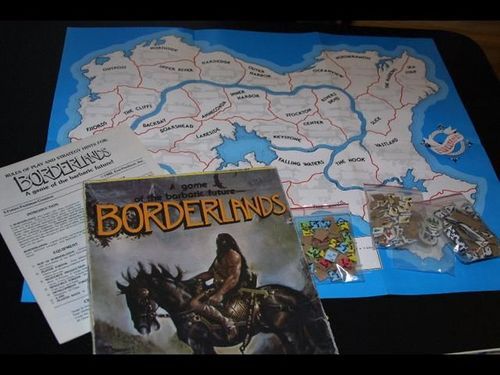
Screenshot comparison of different conversions[edit | edit source]
From left to right: Apple II, Atari, PC-DOS
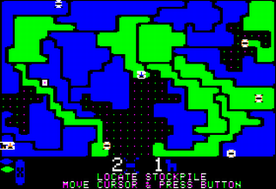 |
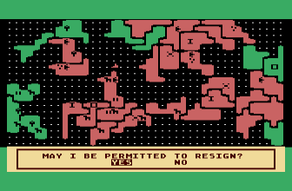 |
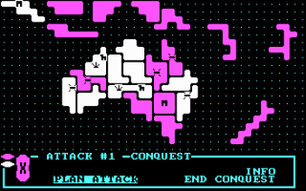 |
Cover[edit | edit source]
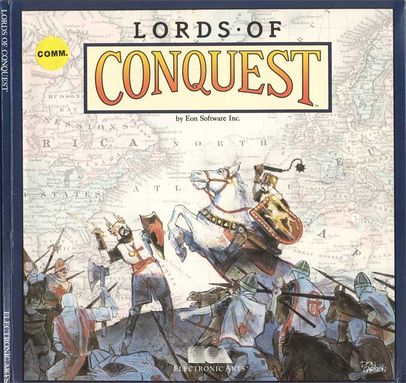 |
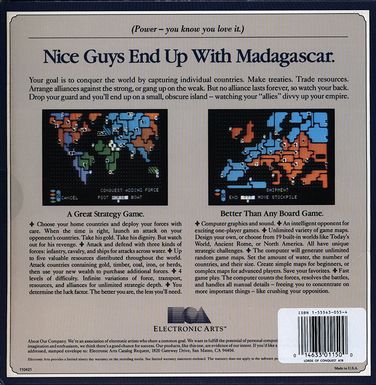 |
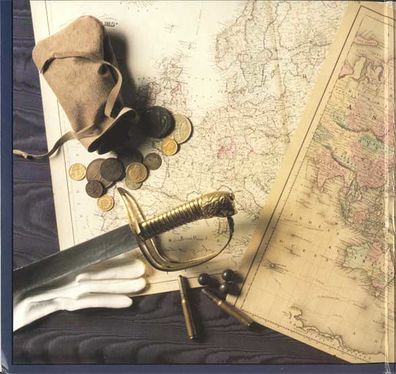 |
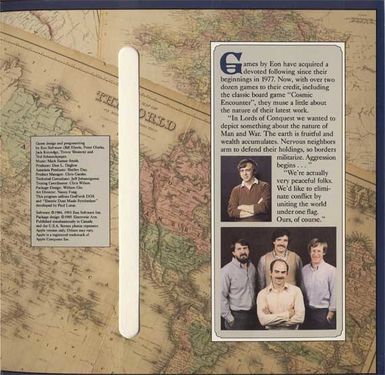 |
Disk label[edit | edit source]

Advertisement[edit | edit source]
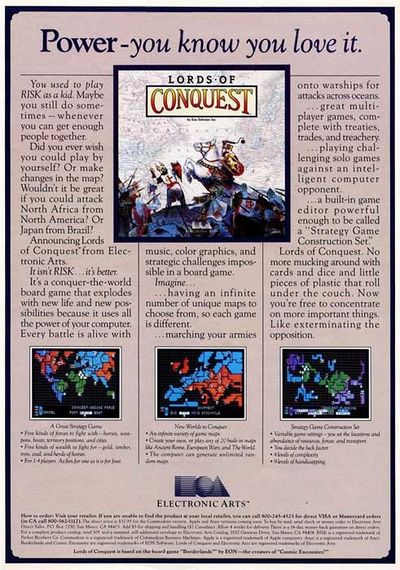
Highscore[edit | edit source]
There is no highscore possible in this game.
Links[edit | edit source]
- C64Games.de - Game No. 108 Cyberpunx Version from 1996
- CSDb - Release No. 51681 Cyberpunx Version from 1996
- Lemon64 - Game No. 1543
- Gamebase64.com - Game No. 4452
- Test Report No. 2817 on Kultboy.com

- ZZap64 test report
